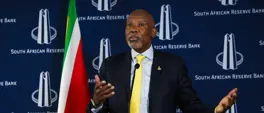Personal Finance: How to invest during a bubble
Paula Luckhoff
7 October 2025 | 19:37Personal finance guru Warren Ingram shares valuable pointers on the different investment strategies you could consider.

Stack of coins, trading, stock market, stocks. Image: 123rf.com
There is a lot of speculation that the US tech shares are in an AI-fueled bubble, while gold continues to deliver record-beating growth.
How do investors navigate these market conditions?
'We are in a gigantic price bubble' warned famed economist David Rosenberg recently.
Part of that warning is that extreme stock valuations point to negative returns ahead.
RELATED: Pointers to maximise your investment growth through 2025 and beyond
While it may seem that just about every stock is on the up, you need to interrogate the details, says Warren Ingram, director of Galileo Capital.
"If you look at the JSE as an example, our market is performing very well, but when you break it down it's a handful of mining shares, and then the Naspers-Prosus combination. but pretty much everything else is doing OK.... and I think the same sort of picture is unfolding in the US."
While the JSE is probably having a fairly normal year in fact, the index tells you that it is having a phenomenal year, he points out.
Ingram shares advice on the options for an investor to consider, which range from riding the wave, to simply sticking to your normal investment strategy.
1. Ride the wave
When markets are in the midst of a big upswing, there is a lot of momentum driving the markets higher.
It can be very dangerous to bet against this momentum because upswings can last for years and valuations can become stratospheric.
If you can ride the wave correctly, you will have the thrill of your life but if you get it wrong, you can lose... badly
2. Choose to opt out
Some people will look at the current conditions and believe they are a replica for the Internet bubble that burst at the start of the century, when losses for many investors were huge.
There's a temptation to sell out of the markets and store your capital in cash or government bonds until the markets crash. The danger with this strategy is that markets could deliver inflation-beating growth for a few years or prices could stabilise without a crash.
If you park your money in cash for a period of three to five years, you could erode the buying power of your money.
3. Spread your risks
If you are prepared to allocate a portion of your money to cheaper sectors, you might benefit from good long-term growth even if there is a market crash in the tech sector.
Allocating your money to a range of assets while limiting your allocation to very expensive sectors could protect you from the worst effects of a crash, while enabling you to benefit from other areas that offer growth potential.
4. Stick to your normal strategy
If you have a good investment strategy that is appropriate for you, it should be designed for a range of different market conditions. That means your investments should already have the correct allocation to shares, bonds, property and cash as well as local and global exposure.
If this is the situation for you, then the best thing to do in these market conditions, is NOTHING!
To listen to Warren Ingram in conversation with Stephen Grootes on 702's The Money Show, click on the audio link below:
Get the whole picture 💡
Take a look at the topic timeline for all related articles.
















